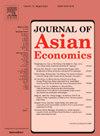亚太自贸区农业经贸合作的可能发展路径:数值模拟
IF 2.9
3区 经济学
Q1 ECONOMICS
引用次数: 0
摘要
探索亚太自由贸易区(FTAAP)农业经贸合作发展路径,对于深化亚太地区经济一体化、加强区域农业发展具有重要的现实意义。本文提出了基于 RCEP、CPTPP 以及 RCEP 与 CPTPP 整合建立 FTAAP 的三条可行路径。此外,本文还利用全球贸易动态可计算一般均衡模型模拟了这三种路径下的宏观经济效应和以中国为代表的农业效应对建立亚太自贸区的影响。研究结果表明,六个共同政策节点将促进参与国的宏观经济增长,RCEP和CPTPP深入实施的效果将大于初步实施的效果。由于参与经济体基础更广、开放程度更高,路径 3 下建立亚太自贸区将产生更大的宏观经济效应和农业效应。因此,基于 RCEP 和 CPTPP 整合的路径是 FTAAP 农业经贸合作的最优选择。各方应积极克服形成 FTAAP 的障碍,为区域农业经贸合作提供稳定的内外部产业发展环境。本文章由计算机程序翻译,如有差异,请以英文原文为准。
Possible development path for agricultural economic and trade cooperation in FTAAP: A numerical simulation
Exploring the path of developing agricultural economy and trade cooperation in the Free Trade Area of the Asia Pacific (FTAAP) is of great practical significance for deepening economic integration in the Asia Pacific region and strengthening regional agricultural development. This paper proposes three feasible paths based on RCEP, CPTPP, and the integration of RCEP and CPTPP to establish FTAAP. Moreover, a dynamic computable general equilibrium model of global trade is used to simulate the macroeconomic effects and the agricultural effects represented by China in forming FTAAP under these three paths. The research results show that six common policy nodes will promote macroeconomic growth in participating countries, and the effects of the in-depth implementation of RCEP and CPTPP will be greater than those of the initial implementation. Due to the broader base of participating economies and the higher level of openness, establishing FTAAP under Path 3 will yield greater macroeconomic effects and agricultural effects. Therefore, the path based on the integration of RCEP and CPTPP is an optimal selection for economic and trade cooperation of agriculture in FTAAP. All parties should actively overcome the obstacles to forming FTAAP and provide a stable internal and external industrial development environment for regional agricultural economic and trade cooperation.
求助全文
通过发布文献求助,成功后即可免费获取论文全文。
去求助
来源期刊

Journal of Asian Economics
ECONOMICS-
CiteScore
4.70
自引率
9.40%
发文量
90
期刊介绍:
The Journal of Asian Economics provides a forum for publication of increasingly growing research in Asian economic studies and a unique forum for continental Asian economic studies with focus on (i) special studies in adaptive innovation paradigms in Asian economic regimes, (ii) studies relative to unique dimensions of Asian economic development paradigm, as they are investigated by researchers, (iii) comparative studies of development paradigms in other developing continents, Latin America and Africa, (iv) the emerging new pattern of comparative advantages between Asian countries and the United States and North America.
 求助内容:
求助内容: 应助结果提醒方式:
应助结果提醒方式:


